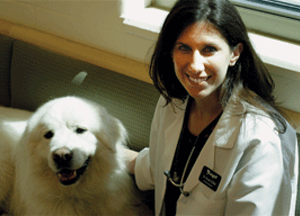-
Adopt
-
Veterinary Care
Services
Client Information
- What to Expect – Angell Boston
- Client Rights and Responsibilities
- Payments / Financial Assistance
- Pharmacy
- Client Policies
- Our Doctors
- Grief Support / Counseling
- Directions and Parking
- Helpful “How-to” Pet Care
Online Payments
Emergency: Boston
Emergency: Waltham
Poison Control Hotline
-
Programs & Resources
- Careers
-
Donate Now
 By Susan O’Bell, DVM, DACVIM (Internal Medicine)
By Susan O’Bell, DVM, DACVIM (Internal Medicine)
angell.org/internalmedicine
internalmedicine@angell.org
617-541-5186
Here in Massachusetts many of us are well aware of the dangers posed by ticks carrying the bacteria that can result in Lyme disease. But there is another “L” infection that may be on the rise and can result in greater morbidity and mortality, for dogs in particular, called Leptospirosis.
Leptospirosis is by no means a new infection, but there are some who would classify it as a “re-emerging disease.” This could be due to the fact that commonly encountered wildlife such as raccoons and rats and many other mammalian species serve as reservoirs for the infection. Additionally, ever expanding “urban sprawl’ puts humans and their companion animal counterparts in frequent close contact with wildlife and their urine. The infectious bacteria are transmitted by contact between infected urine and intact mucous membranes (gums and eyes), and/or with abraded skin, or skin that has been immersed in water for a prolonged time. Indirect transmission can also occur via contaminated water sources, soil, food, or contaminated bedding. Stagnant or slow-moving warm water provides ideal environmental conditions for Leptospira bacteria, and increased incidence has been reported after high rainfall or flooding. There is also traditionally increased seasonal incidence during summer/late fall.
 There are several serovars (or “strains”) of Leptospira that result in a variety of illnesses for dogs. Infection can manifest as kidney failure, severe liver disease, lung and blood infections. Uveitis (inflammation in the eye), meningitis, and auto-immune diseases have also been associated with leptospirosis.
There are several serovars (or “strains”) of Leptospira that result in a variety of illnesses for dogs. Infection can manifest as kidney failure, severe liver disease, lung and blood infections. Uveitis (inflammation in the eye), meningitis, and auto-immune diseases have also been associated with leptospirosis.
There are several forms of clinical leptospirosis and thus the symptoms can vary widely. Any of the following situations may prompt your veterinarian to consider testing for leptospirosis: acute or subacute illness with fever, muscle pain, vomiting, dehydration, vascular collapse, bleeding disorders, kidney pain, decreased appetite, and/or increased thirst and urination. There may also be a chronic version of leptospirosis with symptoms such as fever, progressive worsening of liver and/or kidney function, increased thirst and urination, weight loss, decreased or absent appetite, and/or uveitis.
Leptospirosis is worthy of special consideration because it is a zoonotic disease (one that can be transmitted from animals to humans), and it can be an occupational hazard for people who work outdoors or with animals, campers and people who participate in outdoor sports. People need to do their best to avoid contact with infected material. This is especially the case when cleaning up urine from known ill animals. The safest step is to handle all situations as possible infections. Veterinary personnel caring for possibly infected dogs for example need to wear disposable gloves and a gown as well as eye protection and a mask if there is any chance urine could splash during clean up. Immunocompromised people or pregnant women should avoid contact with any possibly infected animals. As with so many diseases, early signs of infection in humans would be fever and flu-like signs.
Vaccination against four common Leptospira serovars currently diagnosed in dogs (Icterohaemorrhagiae, Canicola, Grippotyphosa, and Pomona) has been possible for decades. Unvaccinated dogs are definitively at greater risk for Leptospirosis infections than dogs who are immunized annually. Although many veterinary practitioners used to consider Leptospirosis a “lifestyle” vaccine, annual vaccination is being recommended far more commonly. This vaccination is also one that appears to retain a stigma of having a higher rate of possible adverse events after vaccination. The latest vaccinations however appear to be very safe. Your veterinarian may discuss separate visits when starting the vaccine series (no other vaccines given that day) to be cautious. The initial vaccine series consists of 2 vaccines a few weeks apart and then annual vaccination thereafter. It is clear that both city and suburban dwelling dogs of all breeds and lifestyles are at risk for Leptospirosis, as are their human companions, so vaccination should be thoughtfully considered for every dog.